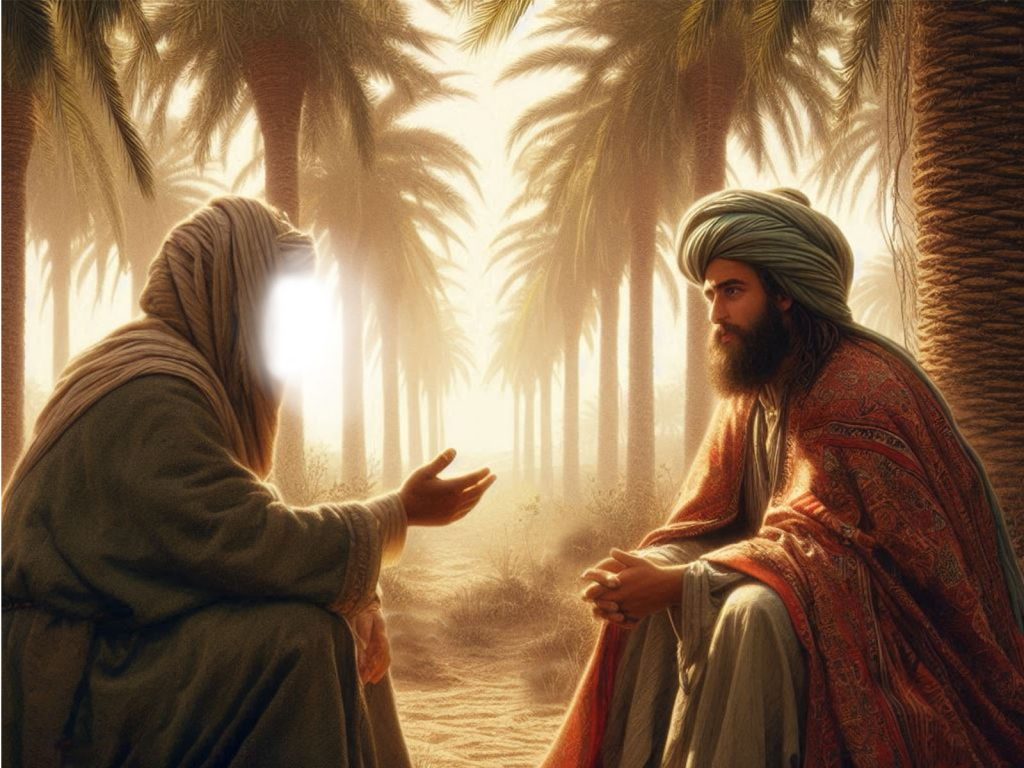It is narrated in history that Abdullah ibn Salam, a Jew from the time of the Prophet Muhammad (peace be upon him), embraced Islam and officially joined the ranks of the Muslims. He had a Jewish friend named “Zayd ibn Shabih.” After embracing Islam, Abdullah would constantly invite Zayd to Islam, explaining the greatness of the Islamic faith, but Zayd stubbornly insisted on remaining Jewish and did not convert.
Abdullah says: One day, I went to the mosque of the Prophet (peace be upon him). Suddenly, I saw Zayd sitting in the row of Muslim worshippers, having become a Muslim. I was very pleased and approached him, asking: “What made you embrace Islam?” Zayd replied: “One day, I was reading the Holy Torah. When I reached the verses describing the attributes of Muhammad (peace be upon him), I read them with deep reflection and committed his characteristics, which were mentioned in the Torah, to memory. I said to myself, it would be better to go to Muhammad and test him to see if he truly possesses those qualities, one of which is ‘forbearance and self-restraint.’ I went to him for a few days and observed his actions, behavior, and words carefully. I found all of those characteristics in him, but I thought there was still one quality left, and I needed to examine it further. That quality was his forbearance and self-restraint. For in the Torah, it is written: ‘The forbearance of Muhammad (peace be upon him) overcomes his anger; the ignorant ones, however much they harm him, will only see forbearance and self-restraint from him.'”
One day, to find this trait in him, I went to the mosque. There, I saw a Bedouin Arab arriving on a camel. When the Arab saw Muhammad (peace be upon him), he dismounted and said: “I come from a tribe that has suffered from drought and famine, and all of us are in dire poverty. The people of this tribe are Muslims, and they hope that you will show them kindness.” At this, Muhammad (peace be upon him) asked Ali (peace be upon him) if there was anything left from the previous alms. Ali (peace be upon him) replied: “No.” The Prophet (peace be upon him) became confused and saddened. At that moment, I approached the Prophet and said: “O Messenger of God! If you wish, I can engage in a deferred transaction with you; I will give you this amount of money now, and when the harvest comes, you can give me the same amount in dates.” The Prophet (peace be upon him) accepted my offer, and the transaction was completed. He took the money from me and gave it to the Bedouin Arab.[1]
I continued waiting, and seven days later, when the time for harvesting dates had almost arrived, I went to the desert. There, I saw Muhammad (peace be upon him) sitting under the shade of a tree, while his companions were seated in different corners. I approached him rudely, grabbed his collar, and addressed him: “I know you well. You take people’s wealth and delay returning it. Do you know that there are only a few days left before the deadline?” I acted so boldly and ignorantly (even though there were still a few days left). Suddenly, I heard a harsh voice from behind the Prophet (peace be upon him). It was Umar ibn al-Khattab, drawing his sword. He turned to me and said, in inappropriate words: “Stay away.” At that moment, Umar tried to strike me with his sword, but Muhammad (peace be upon him) intervened and said: “There is no need for this kind of aggression; he (Zayd) should be advised with forbearance and patience.” He then told Umar to give me a certain amount of dates. Umar took me with him and gave me my rightful share, plus twenty extra measures of dates. I asked: “Why the extra?” He replied: “What can I do? The forbearance of Muhammad (peace be upon him) caused it. Since you were distressed by my harsh reprimand, he ordered me to give you more so that you would be comforted and pleased.”
When I witnessed the noble character and great forbearance of Muhammad (peace be upon him), I became captivated by Islam and the beautiful character of the Prophet (peace be upon him). I bore witness to the oneness of God and the prophethood of Muhammad (peace be upon him), and I joined the ranks of the Muslims.
In the practical life of the Prophet Muhammad (peace be upon him), there are hundreds of similar examples of this noble and beautiful character, each of which reflects a drop from the vast ocean of his exemplary conduct. As God Himself mentions in the Quran: “And indeed, you are of a great moral character” (Quran 68:4). These historical examples of noble ethics shed light on one of the key secrets behind the success of Islam, which played a significant role in its spread.[2]
(Taken from the book Al-Mahajja al-Bayda, authored by Mulla Mohsen Fayz Kashani, translated by Mohammad Reza Attai)[3]
Footnotes:
[1] Salaf transaction refers to a transaction where goods are purchased with immediate payment, but delivery of the goods is made in the future.
[2] (Surah Al-Qalam, verse 4 )
[3] The translator has published the Persian translation of this book under the title The Clear Path.



